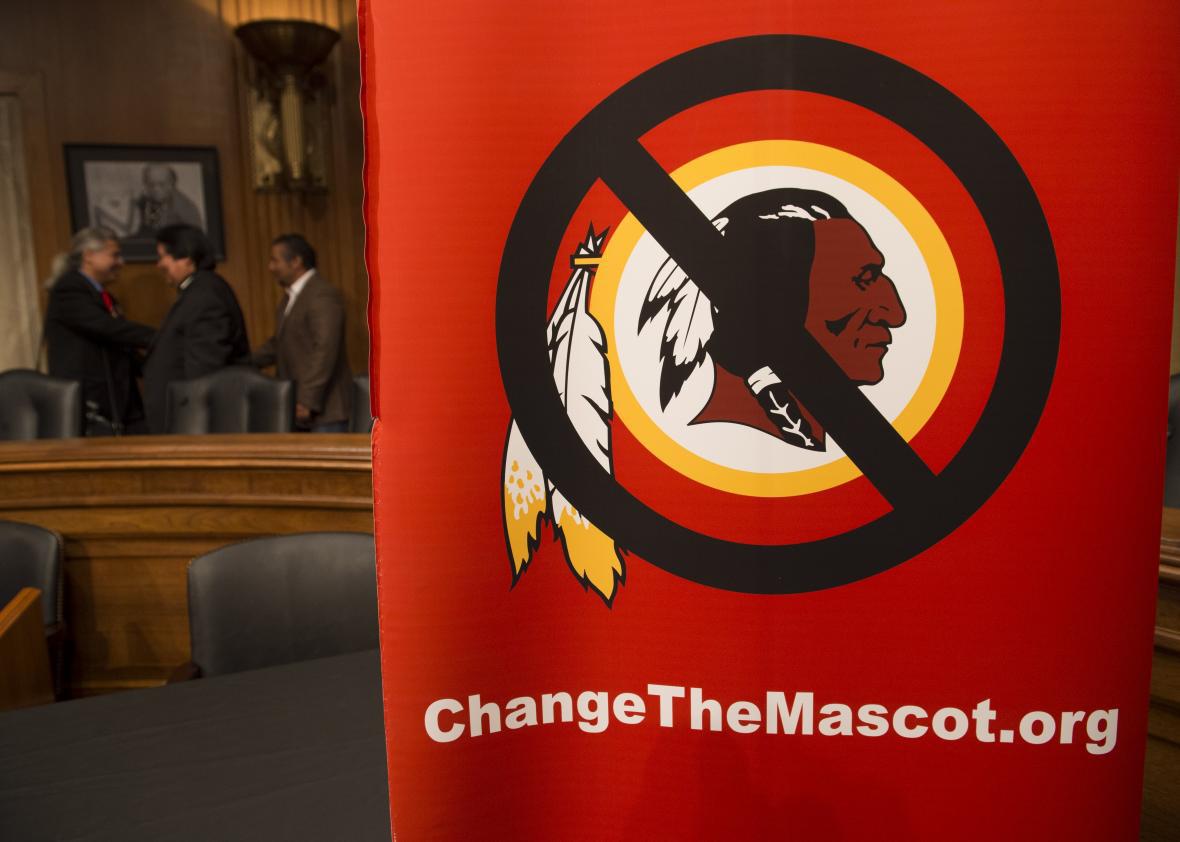The Supreme Court agreed on Thursday to review a case challenging the constitutionality of a law that forbids degrading trademarks—and whose outcome will effectively decide the fate of the Redskins’ legal battle over its name. (Slate does not use the word “Redskins,” which is widely considered to be offensive, except when covering the battle around the team’s name.) Losing trademark protection could cost the team millions of dollars in lost revenue annually, as it would no longer have sole licensing rights over its brand—so many millions that it might even force the team to finally change its name. The new case, Lee v. Tam, does not directly involve the NFL team itself. But it will allow the court to rule on the constitutionality of a law that threatens the validity of the Redskins’ trademark.
Tam centers around a Portland, Oregon rock band called The Slants. The band’s members, who are all Asian American, tried to trademark the name, insisting that it is designed to poke fun at the racial slur. But the U.S. Patent and Trademark Office refused to register the mark, citing a federal law that prohibits the registration of “scandalous” or “immoral” trademarks, or those that “disparage … or bring into contempt or disrepute … institutions, beliefs, or national symbols.” The band sued, arguing that the law violated its free speech rights under the First Amendment. The U.S. Court of Appeals for the Federal Circuit agreed and struck down the provision of the statute that barred from the USPTO from registering “disparage[ing] trademarks.”
“The government cannot refuse to register disparaging marks because it disapproves of the expressive messages conveyed by the marks,” the court explained. “It cannot refuse to register marks because it concludes that such marks will be disparaging to others. The government regulation at issue amounts to viewpoint discrimination,” and thus cannot survive First Amendment scrutiny. A ruffled USPTO appealed the ruling, and now the Supreme Court will wade in to resolve the constitutionality of the law.
The justices’ decision will immediately resolve the Redskins’ own trademark troubles. In 2014, the USPTO canceled the team’s trademark, reasoning that it “disparaged” Native Americans. The team sued, but a federal judge affirmed the legality of the USPTO’s decision, while permitting the team to continue using the marks and suing infringers. Now the case is before the U.S. Court of Appeals for the 4th Circuit. Because Tam bears directly on the Redskins suit, the 4th Circuit will likely await its resolution before rendering a judgment. Its eventual decision must adhere to the Supreme Court’s judgment on the constitutionality of the law in question.
So: Will the Slants—and therefore the Redskins—prevail at the high court? They certainly should. For starters, the USPTO has been both capricious and biased in deciding which trademarks are truly “scandalous,” “immoral,” or “disparaging.” As I explained last year, the rules governing trademark decency can be applied quite curiously. The USPTO rejected Dykes on Bikes’ application for a trademark and refused to register “1-800-JACK-OFF,”—but it agreed to register Jack Off Jill. (The mark “relates at least in part to the nursery rhyme involving Jack and Jill,” the agency explained, “and therefore creates a double entendre.” It did not explain why double entendres are less objectionable than single entendres.) Other questionable trademarks the USPTO has happily registered include “Ganja University,” “Capitalism Sucks Donkey Balls,” “Take Yo Panties Off,” and “Murder 4 Hire.”
This capriciousness is not only biased: To my mind, it’s also unconstitutional. The Federal Circuit certainly thinks so, as does the ACLU: Its attorneys have defended the Slants in court and criticized the USPTO’s cancellation of the Redskins trademark as a threat to free speech.
Under the First Amendment, the government doesn’t get to decide what words are too disparaging to merit legal protections. It doesn’t matter that trademarks are a benefit, not a right: The Supreme Court has long held that the government is generally barred from revoking a benefit “in retaliation for speech” of which it disapproves. In deciding Tam, the Federal Circuit relied on this “unconstitutional conditions” doctrine, holding that the government cannot use a benefits program “to drive ideas or viewpoints from the marketplace.” Otherwise, where would the state’s power to censor intellectual property stop? If the government can deny a trademark because it disapproves of the ideas it conveys, can it refuse to register a copyright for Fifty Shades of Grey because it’s too “scandalous” or “immoral”?
Like many people who strive to be tolerant and respectful, I loathe the Washington football team’s name, and I would love to see it tossed into the ash heap of history. But granting the government vast power to punish speech it dislikes is not the proper way to kill the trademark or the name of the team. If the USPTO can be empowered to decide what marks are too disparaging to permit, it can easily inflict its ideologies on the rest of us, using its own prejudices to shape public conversation. That is not freedom of speech. And the pleasure of sending the Redskins trademark to a much-deserved early grave cannot justify the threat to free expression that such a punishment would pose.
